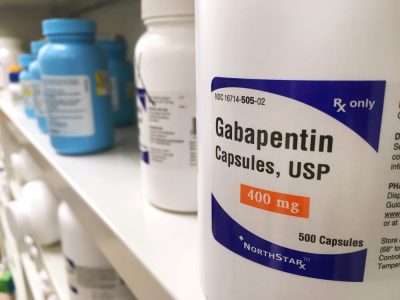Does Gabapentin Help with Opioid Withdrawal?
Gabapentin—an anticonvulsant also used to treat nerve pain—is being researched for potential off-label use to manage pain in patients with chronic, non-cancer pain who are discontinuing opioid treatment or have become addicted to opioids.1, 2
However, because it is still in the research phase, gabapentin may not be a suitable treatment medication for opioid withdrawal or addiction. In fact, research also suggests that at larger doses, gabapentin may lead to as much as a 60% increase in the odds of opioid-related death relative to opioid abuse alone.3 Read on to learn more about the research, why it’s not used as frequently for opioid addiction treatment anymore, and other treatment options for opioid withdrawal and addiction treatment.
What Does Gabapentin Do?
Gabapentin, marketed under the brand name Neurontin, are used as anticonvulsants as well as to treat certain types of neuropathic pain.4 As a treatment for seizures, gabapentin can lower abnormal excitement in the brain. When used for pain management, it can help change the way the body senses pain.5
Potential Off-Label Use of Gabapentin
In addition to these FDA-approved uses of the medication, gabapentin has been and continues to be investigated for several off-label uses. These include:7
- Bipolar disorder.
- Diabetic neuropathy.
- Complex regional pain syndrome.
- Attention deficit disorder.
- Restless leg syndrome.
- Trigeminal neuralgia.
- Periodic limb movement disorder of sleep.
- Migraines.
- Drug and alcohol withdrawal seizures.
Over the last decade or so, there have been a handful of studies suggesting gabapentin may be beneficial in treating symptoms associated with marijuana dependence, alcohol dependence, and as an adjunct to methadone for opioid detoxification.8 A recent clinical trial is investigating gabapentin as an option for patients with chronic pain (not related to cancer) who are on a buprenorphine taper.1
Data from early clinical trials showed that gabapentin could reduce withdrawal symptoms and, when compared with placebo, was associated with reductions in opioid use.1
However, more recent studies and research has demonstrated that gabapentin did not produce better results than a placebo when used for withdrawal symptoms.1
 At the same time, there has recently been an increase in reports of gabapentin misuse alongside other drugs of abuse, including opioids; it’s used to potentiate the euphoric effects as well as moderate withdrawal symptoms.1, 8, 9
At the same time, there has recently been an increase in reports of gabapentin misuse alongside other drugs of abuse, including opioids; it’s used to potentiate the euphoric effects as well as moderate withdrawal symptoms.1, 8, 9
In a small study of substance abuse treatment centers where gabapentin was being used as part of treatment, feedback suggests that patients may end up misusing the drug and that gabapentin misuse might be a first marker for a potential relapse.1, 8
There are other studies that suggest gabapentin used in concert with opioid maintenance medications might pose a heightened risk of adverse effects, the most significant being life-threatening respiratory depression.10
Although gabapentin will likely continue to be investigated as a possible adjunct for opioid withdrawal, perhaps in specific subsets of patients, it is generally not considered a primary method of treatment for opioid use disorder and should be used only after a stringent appraisal of the risks and benefits.
Treatment Medications for Opioid Withdrawal
There are a handful of FDA-approved medications, and a few used off-label, in the treatment of opioid withdrawal symptoms. These include:11, 12, 13, 14, 15, 16
- Methadone. This is the most frequently used opioid agonist used for detoxification. It’s approved by the FDA for this use. It displaces the abused opioid, reversing opioid withdrawal symptoms.
- Buprenorphine. This partial opioid agonist was initially approved to treat pain but has also since been approved by the FDA as a detox agent and for opioid maintenance treatment as an alternative to methadone.
- Suboxone. This contains both buprenorphine and naloxone, a medication designed to rapidly reverse opioid overdose. The use of suboxone is intended for people who are dependent on opioids and have already started and are continuing medication therapy. It is FDA approved.
- Lofexidine, which was recently approved by the FDA to help relieve symptoms of opioid withdrawal. A similar drug, clonidine has been widely used off-label for the same purpose, but may carry with it an increased risk of hypotension compared to lofexidine. Both drugs are less effective than methadone and buprenorphine in treating drug cravings during opioid withdrawal, but clonidine has been shown to be effective in prolonging the duration of abstinence together with buprenorphine—suggesting that lofexidine may also be a useful adjunct.
Get Help with Opioid Addiction
Detoxification is an important first step in treating an opioid use disorder. Once detox is complete, the intensive work of recovering from opioid addiction can begin.
Addiction is a chronic but treatable disease that runs deeper than physical dependence on a substance. Once someone is past acute withdrawal and feeling physically and mentally stable, they can begin to recognize and revise harmful thoughts and behaviors that lead to substance, as well as gain alternative coping skills to help them avoid or manage triggers to use substances. This is primarily learned through individual and group therapy and counseling. Maintenance medications such as methadone or buprenorphine may also be part of treatment beyond detox to help stave off cravings and prevent relapse.
Treatment can be performed in a variety of settings, and some people may receive treatment in more than one setting as needed.17
If you or a loved one is considering addiction treatment in Florida, reach out to a River Oaks Admissions Navigator at . They can tell you what to expect as a patient or when a loved one enters treatment at River Oaks. They can also answer many questions regarding insurance and payment options for inpatient or outpatient care.